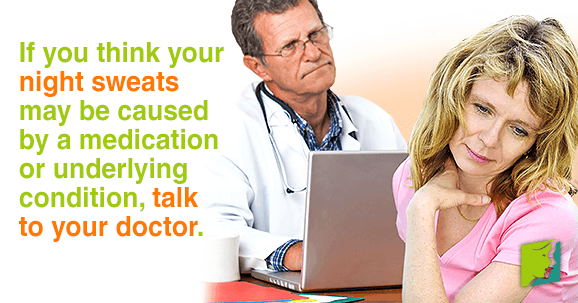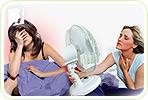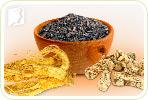Sweating at night is unpleasant, to say the least. Nocturnal hyperhidrosis - better known as night sweats - is a common menopause symptom and a real nighttime nuisance. Awakening to find yourself cold and clammy from a sweating episode can feel uncomfortable, unhygienic, and make it difficult to get back to sleep. When this happens regularly, sweating at night can cause sleep deprivation and ultimately result in fatigue. But, is it always necessary to see your doctor to rid yourself of night sweats? Keep reading to find out.
Why Do Night Sweats Occur?
For women in their forties and early fifties, the primary cause for night sweats is usually hormonal. During perimenopause, levels of estrogen and progesterone become imbalanced as the body reduces its hormone production in preparation for menopause. This can invoke a series of activities that often cause sudden and seemingly random increases in internal temperature, to which the body responds by flushing the skin and producing sweat to cool down. This effect is termed “hot flashes” when it happens during the day, and “night sweats” when it happens nocturnally.
Do I Need to See a Doctor?
Sweating at night can also be symptomatic of other conditions, regardless of age or gender, including a fever, anxiety, and thyroid disorders. Certain medications, including chemotherapy, can also cause sweating episodes. If you have reason to believe that you are sweating at night because of your medication or a health disorder - if you have other bothersome symptoms, for example - this is the time to consult a doctor; otherwise, it's worth trying the following lifestyle adjustments first.
Changing Evening Habits
Sweating at night occurs primarily for hormonal reasons during menopause, but certain triggers can cause or contribute to the onset of the symptom. To reduce night sweats, try keeping your evening routine free of dietary stimulants and make it as conducive to restful sleep as possible. Limit alcohol, caffeine, and spicy food consumption to avoid stimulating internal activity and resultant sweating episodes, and look for ways to relax in the evening to promote a good night's sleep. These could include:
Drinking herbal tea. Sage is a sweat-relieving herb, while lavender, St. John's wort, and valerian are relaxing ones. Any of these could help you sleep without awakening sweaty.
Meditation. Breathe deeply and burn incense, or play calming music to achieve a relaxed state.
Avoiding evening exercise. Work out earlier in the day, instead, as exercise increases internal temperature for more than two hours after exertion.
Environmental Adjustments
Sweats are less likely to occur if the body is consistently cool. Keeping a ventilated sleeping environment could go a long way in achieving this. Try the following:
- Sleep with a window open
- Avoid using central heating in your bedroom
- Keep a cold glass of water next to your bed to sip
- Swap heavy, restrictive quilts for layers of cotton sheets
- Sleep naked, or swap clingy lace or silky nightwear for loose cottons
Of course, if you make the suggested changes to your evening routine but sleeping environment and sweating episodes continue to plague your sleep, it may be worth consulting your doctor for further advice and to rule out any other health concerns. Sleeping restfully and hygienically is vital to keep energy levels up during the day; making a few small changes to your routine is a small price to pay for a good night's sleep.
For further information on how to deal with night sweats during menopause follow the link below.
Sources
- Dall, L. & Stanford, J.F. (1990). Fever, Chills, and Night Sweats. In: Clinical Methods: The History, Physical, and Laboratory Examinations. 3rd ed. Boston: Butterworths. Retrieved from http://www.ncbi.nlm.nih.gov/books/NBK324/
- Medicine: Biomolecular and Clinical Aspects. 2nd ed. Boca Raton (FL): CRC Press. Retrieved from http://www.ncbi.nlm.nih.gov/books/NBK92761/
- National Health Service UK. (2011). Night sweats. Retrieved June 23, 2014, from http://www.nhs.uk/conditions/night-sweats/Pages/Introduction.aspx
- Shenefelt, P.D. (2011). Herbal Treatment for Dermatologic Disorders. In: Herbal




